Associates to Companions – A New Chapter
October 17, 2020As Mary MacKillop continues to inspire people today, the Associate movement which began over thirty years ago, is now one of the four recognised pathways of sharing in the Josephite charism.
Today the movement has ‘taken fresh courage’ and steps forward into the future with a new name – ‘Josephite Companions’.
Please join us in the launch of this new name, logo and prayer by viewing the following video…
Mary MacKillop’s Words of Wisdom
October 16, 2020Mary MacKillop’s words of wisdom – Take Fresh Courage.
Greetings on this 10th Anniversary of the canonisation of Mary MacKillop. Our hearts are filled with joy when we remember the excitement and gift of this day in 2010. Australians, Sisters from across the Congregation and the people with whom we had ministered were filled with great pride as we celebrated this special moment in our story.
Let us pause and remember that moment when Mary MacKillop was acclaimed as a saint of the universal church. Do you remember where you were and how you felt. My heart was filled with joy.
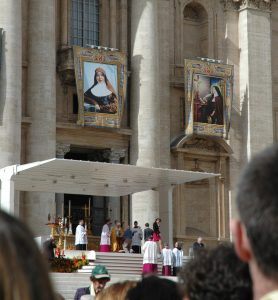 Let us take a moment’s silence and reflect on how the spirit of St Mary of the Cross MacKillop has continued to live on in each one since her canonisation. How has each one been gifted? How has her life continued to shape my commitment to living the Gospel way of life and to making a difference in the world?
Let us take a moment’s silence and reflect on how the spirit of St Mary of the Cross MacKillop has continued to live on in each one since her canonisation. How has each one been gifted? How has her life continued to shape my commitment to living the Gospel way of life and to making a difference in the world?
As we celebrate on this 10th anniversary, we recall that one of her marks of holiness was her capacity to persevere in the face of adversity. She teaches us to search for the seed of opportunity in every difficulty. In 1877 Mary MacKillop wrote a letter to her Sisters in a time when their very existence was being threatened. Her ever reassuring presence encouraged her Sisters to lean into the heart of God and to ‘Take Fresh Courage’.
Mary MacKillop’s life continues to speak to the realities of our lives. COVID-19 has turned our lives upside down in a variety of ways. It has called upon all our strength and resilience to ‘Take Fresh Courage’ as we find new ways of living with hope in a chaotic world.
As we celebrate this moment, may St Mary of the Cross MacKillop wrap her love around our hearts whispering to us to ‘Take Fresh Courage’.
As we remember with gratitude this special day, may we treasure the memories and rejoice in her continued blessing for our church and our world.
We thank God for the life, wisdom and continued contribution of St Mary of the Cross to Australia and our world.
Happy celebration.
Sr Monica Cavanagh
Congregational Leader
You’re invited to view Sr Monica’s video message below…
Josephite Associates become Josephite Companions
October 15, 2020A New Chapter for Josephite Associates.
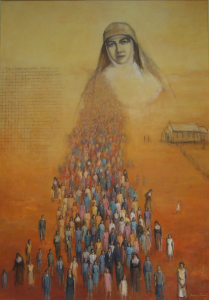
On this tenth anniversary of the canonisation of Saint Mary MacKillop, we also celebrate a milestone in the life of those women and men who are drawn to give expression to living the Gospel with a Josephite heart.
Formerly known as Josephite Associates, the Josephite Companions will launch their new name together with a new logo on Saturday 17 October 2020. In association with the Sisters of Saint Joseph of the Sacred Heart, Josephite Companions embrace the Josephite charism as they live the Gospel in their daily lives.
The Josephite Associates Movement (now Companions), stemmed from the teaching of the second Vatican Council with its vision of Church and community. Josephite Companions are women and men from all walks of life who are drawn to the spirit of St Mary MacKillop and Julian Tenison Woods and who are active in ministry in Australia, Aotearoa New Zealand, Peru, Timor-Leste and Scotland.
Josephite Companions participate in the life and mission of the Church by living out the Josephite charism through friendship, prayer and service. They firmly believe that “doing the ordinary with a Josephite heart” is a way of enriching their own lives as well as the lives of others.
Together with their new name and newly designed logo, new resources including a Companions’ Prayer and a “Discovery Program” have also been developed. All of which are for anyone wishing to explore the idea of becoming a Josephite Companion.
Josephite Companions rejoice in going forward and living life in the spirit of St Mary MacKillop as they continue God’s mission in an evolving world.
The link to the new Josephite Companions section and their launch video will be available on the Sisters of Saint Joseph website from Saturday 17 October 2020.
Media Release: Celebrating the 10th anniversary of Saint Mary MacKillop’s canonisation
Sydney, 12 October 2020: This Saturday 17 October 2020 will mark the 10th anniversary of Saint Mary MacKillop’s canonisation at Saint Peter’s Basilica in Rome, declaring her Australia’s first canonised saint.
Pope Benedict XVI addressed tens of thousands gathered in St Peter’s Square. About 9000 Australians travelled to celebrate this occasion.
For Catholic, Christian and secular Australians, it was a meaningful moment, celebrating the values at the heart of what it means to be Australian, as well as her witness to the sacred in everyday life. Ten years on, the Sisters of Saint Joseph invite the Australian community to take this opportunity to reflect on what the canonisation of Saint Mary MacKillop meant to Australians then, and what it means to us now.
To celebrate the 10th anniversary of the canonisation of Saint Mary MacKillop and the wonderful life and legacy she left behind, the Sisters of Saint Joseph of the Sacred Heart are pleased to remember her with commemorative prayers, videos, and a global vigil in her honour.
Inspiring all Australians to take courage and maintain hope as Mary did throughout her life, the theme chosen for this celebration is ‘Take Fresh Courage’. This theme chosen against the backdrop of the many challenges Australians have faced in 2020 is taken from a letter written by St Mary MacKillop in 1877.
On 16 October 2020 at 8pm AEST, the Sisters of Saint Joseph will hold Courage Hour, a global vigil of deep peace, prayer, and reflection. The Sisters invite all who may wish to participate to join the Vigil online www.sosj.org.au/10th-anniversary and celebrate Mary’s life and follow her lead to ‘Take Fresh Courage’…
Please continue reading the Media Release here (PDF)
For more information, please contact:
Kathleen Norman
Communications Manager
Sisters of Saint Joseph
Kathleen.Norman@sosj.org.au
+61 2 8912 2722 +61 438 006 566
Join us for Courage Hour
October 14, 2020Join us for a global Vigil to celebrate the 10th anniversary of Mary’s canonisation.
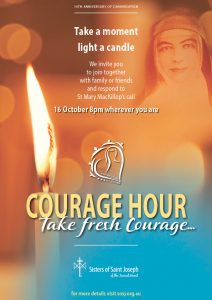 The Sisters of Saint Joseph of the Sacred Heart invite you to join us for a global Vigil of deep peace, prayer and reflection to celebrate the 10th anniversary of Saint Mary MacKillop’s canonisation.
The Sisters of Saint Joseph of the Sacred Heart invite you to join us for a global Vigil of deep peace, prayer and reflection to celebrate the 10th anniversary of Saint Mary MacKillop’s canonisation.
This Vigil invites us to come to peace and prayer and wrap our world in courage, that same courage from which Saint Mary MacKillop lived her life. Together let us ‘Take Fresh Courage’ for ourselves and for our world.
You may pray this Vigil alone; in a face-to-face group or perhaps join the online Guided Reflection.
The Sisters of Saint Joseph will be providing a scripted video resource that you can use for the online Guided Reflection, which is something that can be played at any time. The script for Courage Hour is also available in the Encountering St Mary MacKillop in Prayer booklet starting at page 26 available in English, Spanish and Italian on the webpage below.
Please note, the online Guided Reflection is not live and does not require you to register.
This Vigil will take place on Friday 16 October at 8:00pm your local time.
To view the video and Encountering St Mary MacKillop in Prayer booklet, visit the webpage provided below:
Celebrating Mary’s Canonisation
Together, we can all follow Mary’s lead and #TakeFreshCourage.
Stormbirds Storm Bushfire Season
October 8, 2020Growing through natural disaster.
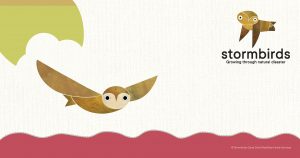 As the school year progresses, request for help continues with school leaders describing noticeable challenges for children with attention, behaviour and learning. As one school principal described “cracks are beginning to appear”. School leaders have commented on the impact of the disaster event for parents and carers and school staff. COVID-19 is further exacerbating these challenges and highlighting the considerable change and loss children, young people and adults can experience as a result of disaster events.
As the school year progresses, request for help continues with school leaders describing noticeable challenges for children with attention, behaviour and learning. As one school principal described “cracks are beginning to appear”. School leaders have commented on the impact of the disaster event for parents and carers and school staff. COVID-19 is further exacerbating these challenges and highlighting the considerable change and loss children, young people and adults can experience as a result of disaster events.
We have been fortunate to secure funding to provide our Stormbirds natural disaster education program for children and young people in bushfire-impacted communities. The Stormbirds program is embedded in the principles of the evidence-based Seasons for Growth program, supporting children and young people to adapt to experiences of change, loss and grief resulting from natural disasters. The impact of such change and loss can be felt at the time of the event and in the weeks, months and even years following.
Fully-funded Training & Program Delivery
We have funding to train professionals in schools to facilitate the small group program over the 4-week sessions with the children and young people.
- Registrations: click here
- For further information on Stormbirds, visit the Good Grief website here.
Please share this information with your staff and colleagues.
Additional Useful Resources
Self-care & COVID-19 Resources:
- A Guide to Self-Care and Wellbeing During Times of Uncertainty
- Supporting your Child’s Social & Emotional Wellbeing
Justine Richardson
Good Grief
A Day in the Life: Sr Kim Barnes
A Day in the Life of Kim Barnes rsj – Lochinvar Josephite
And so, reflecting on this, I begin my ministry each day as a chaplain at Catholic Care Social Services. I try to see that all those I reach out to are part of that tapestry – each a coloured thread and in between a golden thread connecting us to a much stronger, deeper, caring, and loving relationship with our God.
I have been working at Catholic Care since 2014. In my role I aim to be a presence to others, to listen with respect, to be non-judgemental, to be confidential and caring and to be with people in their times of joy as well as their times of pain. During the past six years I have supported both staff and clients. No two days are ever the same. It is a ministry that is interesting, life-giving, unpredictable and at times challenging but it also brings many blessings. These challenges and blessings have brought me and some of those I reach out to on behalf of Catholic Care, to a much deeper and closer relationship with God.
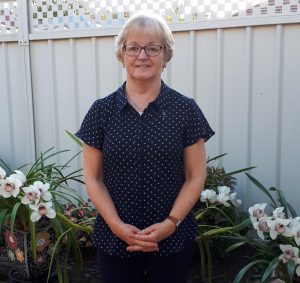
The time I spend with staff is so important. I begin each day walking around the office simply to say hello to all. If they have time to engage in some way, we have a chat or a chuckle about what is happening at that time. I try to pick up on the atmosphere in general to gauge how their day is starting out. This may lead me to make further contact by sending an email to an individual or group perhaps with a prayer attached or a funny little memo to brighten their day.
In addition, my time is spent attending funerals, visiting hospitals and nursing homes and people in their own homes, accompanying when asked to medical appointments or solicitors, contacting St Vincent de Paul or other welfare agencies when extra support is needed. As well, I am a member of a couple of Diocesan Committees and so attend these meetings on a regular basis.
Because of the challenges, and therefore changes we are all facing in this time of Covid-19, some of my day to day ministries have gone from face to face visits to making contact by phone and attending Zoom meetings.
As I write I have paused to look at a poster that hangs on my office wall. There are three gorgeous meerkats all standing tall and looking out in different directions. Underneath there are words with the heading: “Four Beautiful Thoughts of Life.”
- Look back and Get Experience
- Look forward and See Hope
- Look around and Find Reality
- Look within and Find Yourself
This poster has hung on my wall for a couple of years and little did I know how much it would speak to and touch not only me but those who have come into my office during these uncertain times.
Another poster I have on the wall is one of Jesus standing and knocking at a door. It has the words: “I stand at the door and knock; if any hear my voice and open the door, I will come into their house…” (Rev.3:20). I do my best to be a presence to all those who knock on my door by welcoming them into a place where they can just be, talk, cry, vent, pray or even have time out alone if needed.
Then there is the one of a young and very handsome Jesus fitting in with and relating more with young people in today’s world. I often have conversations with staff, initiated by them, about this man we call Jesus and how they relate to this picture because he “looks” human and so much more approachable.
Through my ministry at Catholic Care I have listened to people from all walks of life and from various faith backgrounds, some who believe and others who do not – or so they say!
These past six years have been a broadening and rewarding experience for me, one that opens me, and others, to deep, unchartered waters.
Kim Barnes rsj
On the Spirituality of Fr Julian Tenison Woods
Spirituality: the inclination of the heart and how it is moved in God’s promptings.
The following are different aspects of Father Woods’ spirituality. They are interrelated and integrated.
The first is awe before God. At Penola, on Pentecost Sunday 2010, Mary’s canonisation year, Fr Paul Gardiner sj preached at Mass before the opening of Fr Woods Park. He said that Fr Woods’ spirituality was grounded in his awe before God, that all other gifts of the Spirit in his life were on this foundation: awe before God, inspired by the vast cosmos, the huge variety of life forms, the structures invisible to the human eye and the mystery of God within each person.
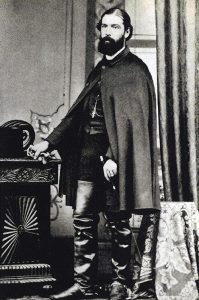 Another aspect of Fr Julian’s spirituality is a deep sense of the Incarnation: recognising the Incarnate God in the person of Jesus and losing his heart to Him. It was Jesus in his family, Jesus in his infancy- ‘little tot’, Jesus in His Sacred Heart, Jesus in his weakness, Jesus in suffering, on the cross. It was Jesus in frailty and weakness whom Julian saw in the children and adults of his time: it was this same Jesus he gave himself to serve.
Another aspect of Fr Julian’s spirituality is a deep sense of the Incarnation: recognising the Incarnate God in the person of Jesus and losing his heart to Him. It was Jesus in his family, Jesus in his infancy- ‘little tot’, Jesus in His Sacred Heart, Jesus in his weakness, Jesus in suffering, on the cross. It was Jesus in frailty and weakness whom Julian saw in the children and adults of his time: it was this same Jesus he gave himself to serve.
Next, his love for Mary, the mother of Jesus. Julian’s knowing Jesus in his family meant his knowing Mary personally and a life-long love for her. He pondered her joys and sorrows. In the sorrows, rejection, misunderstanding and isolation in his own life, he gained his strength not only from communion with Jesus in his suffering, but with Mary in her sufferings as the mother of Jesus. His favourite title of Mary was the Immaculate Heart of Mary. His frequent prayer was Sweet Mother I’m trusting to you. His love for Jesus in his infancy, childhood and youth let him also know and love Joseph personally. He entrusted himself to Joseph as his protector.
In Julian’s attitude, all aspects are united in Jesus, above all in the Sacred Word and the Eucharist. Here he was with the living Risen Jesus. The living Risen Jesus was real for him. He was with Him, person to person.
Another aspect is the totality of his dedication to God, responding to God with his whole heart, giving absolutely all his being, his energy. His motto in his crest was Vota Vita Mea. My life is vowed, my life is consecrated. It was everything, interior and whole being, for God. (Col 3: 24a).
The total dedication summoned courage in the conviction that ‘I will be with you and will not fail you.’ (Fr Woods’ Desk plate, Dt 31 :8, Jer 1:8). It gave trust despite all odds. He wrote in his last months, ‘It is with hopeful confidence that I say resurgam. (I will rise up). I am cheerful and happy’. (Fr Woods to friend, William Archer 13 Mar 1889).
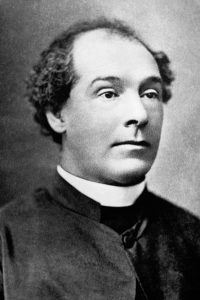 The last aspect I note was his living out obedience to God, submitting himself humbly to the designs of God, giving himself in love as again and again he moved or was moved from place to place, task to task, right to the end when stripped of health and church recognition. Mary MacKillop spoke of this aspect in his leaving Adelaide. (Julian Tenison Woods: A Life, 153-4, 2010 edition) Today, some would call this adjusting to changes as going with the flow. Yes, that is true. But it often meant total uprooting and cost deeply, interiorly. In the keen suffering, he kept the gaze of his heart on Jesus. He wrote in his poem, Follow Me.
The last aspect I note was his living out obedience to God, submitting himself humbly to the designs of God, giving himself in love as again and again he moved or was moved from place to place, task to task, right to the end when stripped of health and church recognition. Mary MacKillop spoke of this aspect in his leaving Adelaide. (Julian Tenison Woods: A Life, 153-4, 2010 edition) Today, some would call this adjusting to changes as going with the flow. Yes, that is true. But it often meant total uprooting and cost deeply, interiorly. In the keen suffering, he kept the gaze of his heart on Jesus. He wrote in his poem, Follow Me.
In summary, I offer these words of Proverbs as the key his spirituality:
Paraphrasing
Jan Tranter rsj
Sources:
[1] Hymns and Sacred Poems by Julian Tenison Woods, Alvernia, Sydney, 1890
This talk was presented at the gathering of Sisters of St Joseph, Nundah, 7 October 2018
